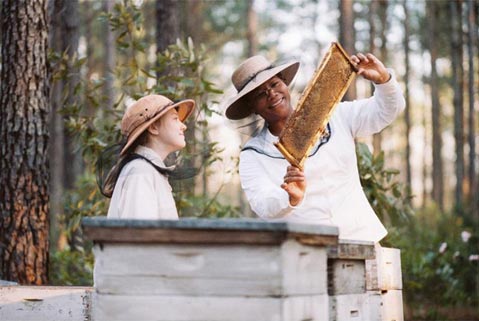The Secret Life of Bees
Dakota Fanning, Queen Latifah, Jennifer Hudson, and Sophie Okonedo star in a film written and directed by Gina Prince-Bythewood, based on the novel by Sue Monk Kidd.

The faithfulness of this screen adaptation of the popular novel ultimately ends up being both this film’s strength and weakness. Although introducing the viewer to characters with whom we can identify and care about, some of the situations in which it places those characters simply aren’t believable.
In South Carolina in the days immediately following the 1964 passage of the Civil Rights Act, 14-year-old Lily (Dakota Fanning), a lonely and sensitive white girl, and her black housekeeper Rosaleen (Jennifer Hudson) hit the road to escape their hometown. Lily is seeking refuge from her abusive father, T. Ray (Paul Bettany), and Rosaleen is running for her life from racists who beat her and want to finish the job. Their journey lands them on the doorstep of the Boatwright sisters, a trio of black women unlike any Lily or Rosaleen has ever met before-“so cultured and refined,” in Lily’s words. Although June (Alicia Keys), the tough middle sister, worries rightly that whatever trouble Lily and Rosaleen have fled will follow them to the Boatwright home, eldest sister August (Queen Latifah) agrees to take them in. Once there, Lily learns about beekeeping from August, meets her first love, and (most importantly) unlocks the mystery of her mother, who died 10 years earlier in a tragedy in which Lily played a key role.
Hollywood seems to have an unquenchable appetite for Civil Rights-era stories centered on white protagonists, but don’t blame Fanning, who gives a naturalistic, nuanced performance. Unfortunately, the rest of the talented cast is often not given enough to do. Latifah, who seems too young for the character she’s playing, is unswervingly kind and maternal; Hudson shows flashes of steel as Rosaleen, but the character drops out of the story for long stretches. Keys’s sharp-tongued June and Sophie Okonedo’s emotionally troubled youngster, May Boatwright, are able to convey more complexity, but the film’s attempt at the end to humanize T. Ray feels forced. Given the era and the violence that always threatens, Lily’s budding romance with Zach (Tristan Wilds), an African-American beekeeping apprentice, also fails to ring true.



